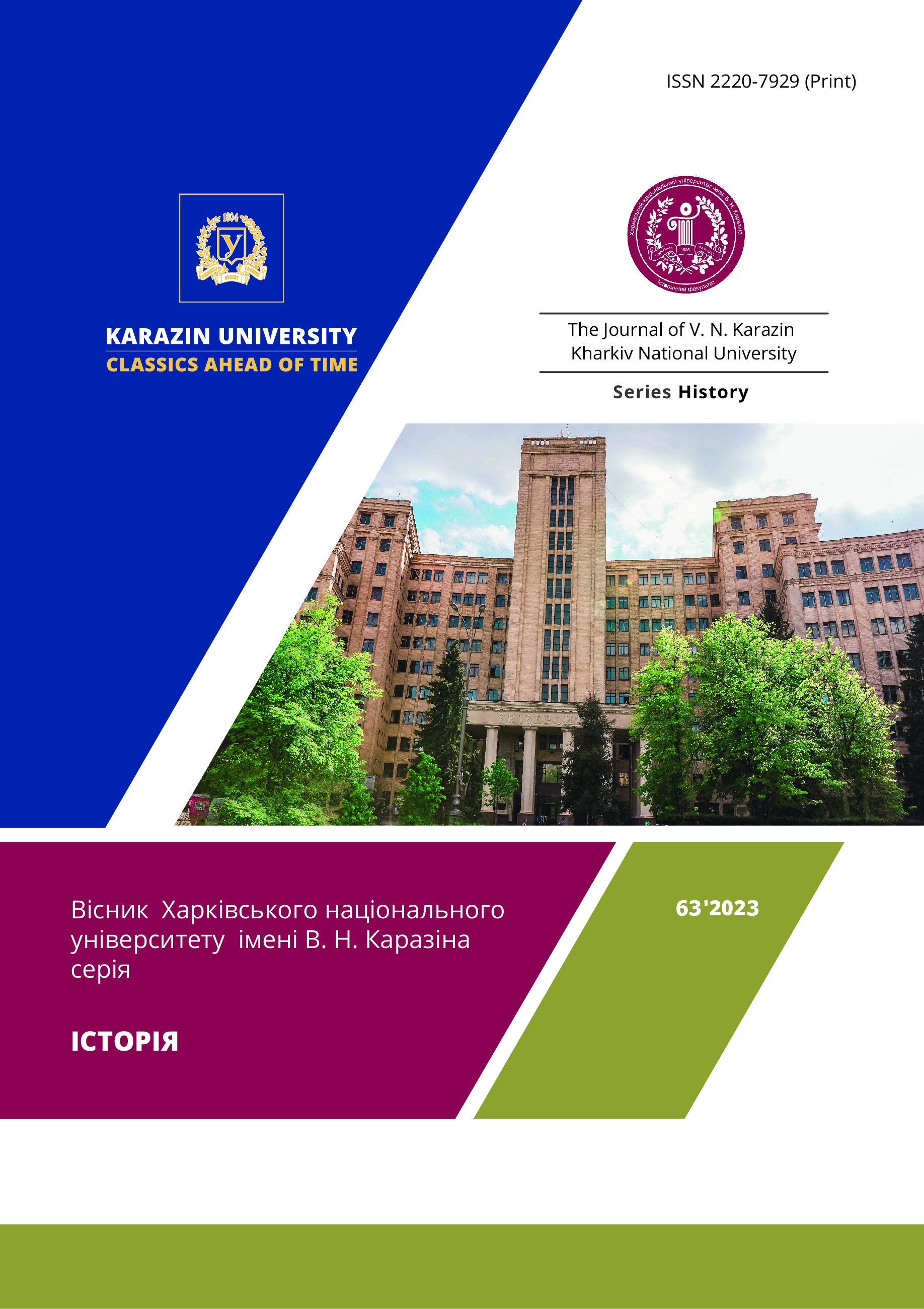Illegal Activities of Private Entrepreneurs in the Kharkiv Meat Trade (Second Half of the 1920s – Early 1930s)
Abstract
The article examines the shadow activities of private entrepreneurs in the Kharkiv meat trade at the tail end of the NEP. The author analyzes the source base and historiography of the problem and finds that the understanding of this subject, despite certain positive shifts in recent decades, remains rather one-sided, which justifies its further in-depth study. The source base of the article is represented by various groups of reliable documents and provides a sufficient basis for a thorough consideration of the problem. The article illuminates the operating conditions of the meat trade in Kharkiv, uncovers the reasons for the development of illegal entrepreneurship, and characterizes the factors that contributed to the involvement of private capital in this sphere. The role of the Bolshevik state is highlighted: with its ‘class policy’ regarding the institution of private entrepreneurship, it squeezed out entrepreneurs into the sphere of illegal commerce. The paper explores the forms of adaptation of shadow entrepreneurs/hustlers to the conditions of the winding down of the NEP and the methods of illegal entrepreneurial activity in the Kharkiv meat trade and analyzes various ways of avoiding state control and taxation by meat trade hustlers. In order to avoid control by state authorities over their activities, the ‘bigwigs’ of the meat trade employed a number of means: they evaded the claiming of patents (patent-free trade) or used dummies for this purpose, claimed patents for smaller-category enterprises, used peasants for covering up their commercial activities, bribed employees of state structures (village councils, veterinary inspections, staff of state slaughterhouses), and resorted to various forms of social mimicry (such as the status of an employee in specially created fake cooperatives, a joint-stock form of entrepreneurship, etc.) to hide shadow activity. The forgery and falsification of financial documents and their deliberate destruction were also common. Among the shadow hustlers operating in the meat trade, there were many individuals with a criminal past and deviant behavior, which in general had a negative impact on the image of the trade. As the NEP was being phased out, in its efforts to fight shadow entrepreneurship and destroy the illegal meat trade the Bolshevik state actively applied both strict economic and (mainly) administrative and repressive measures. The systematic use of such measures towards the end of the NEP in fact aimed at the complete eradication of private commercial activity (including legal) in this sphere.
Downloads
References
Derzhavnyj arkhiv Kharkivs'koi oblasti (DAKhO). (In Ukrainian)
Derzhavnyj arkhiv Khersons'koi oblasti. (In Ukrainian)
Tsentral'nyj derzhavnyj arkhiv vyschykh orhaniv vlady (TsDAVO) Ukrainy. (In Ukrainian)
Kharkivschinа v cifrah ta faktah. Kharkiv, 1928/29. (In Ukrainian)
Kharkivs’ka okruga. Statistichnij schorichnyk. Kharkiv, 1927. (In Ukrainian)
Kron, C. Potrebytel’skaya kooperacia na novom etape. Voprosy torgovli, 1930, no. 7, s. 35-48. (In Russian)
Kulʹchytsʹkyy, S. Komunizm v Ukrayini: pershe desyatyrichchya (1919–1928). Kyiv, 1996. (In Ukrainian)
Lantuh, V. Stanovlenye і razvitye torgovli v Ukraine v 1921–1932 gg. Kharkiv, 1992. (In Russian)
Lobach, K. Nepmany na spozhyvchomu rynku Ukraini (20-ti roky). Kyiv, 1994. (In Ukrainian)
Materialy do zvitu Kharkivs’koi mis’koi radi ХІ sklikannya za 1926–27 i 1927–28 roky. Kharkiv. (In Ukrainian)
Oficiynij buleten’ Narodnogo komisariatu finansiv (NKF) USRR, 1928, no. 34 (130), 6 lutogo. (In Ukrainian)
Oficiynij buleten’ Narodnogo komisariatu finansiv (NKF) USRR, 1930, no. 14 (302), 14 sichnya. (In Ukrainian)
Onatckij, M. Privatne torgivel’ne i promislove pidpriemnictvo u Kharkovi v period NEPu (1921– 1929). Avtoreferat dysertatsii na zdobuttia naukovoho stupenia kandidata istorychnykh nauk. Kharkiv, 2013. (In Ukrainian)
Pirih, O., Chernyak, D. Pidpriemnictvo v Ukraini: vid vitokiv do s’ogodennya. Kyiv, 2011. (In Ukrainian)
Scherbina, I. Posilennya nelegal’noi pidpriemnic’koi diyal’nosty ta borot’ba z neu v roky zlamu nepu (kinec’ 1920-h-pochatok 1930-h rokiv). Kul’tura narodov Prichernomor’ya, 2005, no. 73, s. 209-213. (In Ukrainian)
Sigal, B. V. Do pitannya pro privatnij capital na Ukraini: statistiko-ekonomichny narisi. Kharkiv, 1929. (In Ukrainian)
Sigal, B. Privatnij capital na schlyahu do likvidacyi. Bilshovik Ukraini, 1930, no. 7, s. 62-75. (In Ukrainian)
Skubiy, I. Torgivlya v Kharkovi v roky nepu (1921–1929): ekonomika ta povsyakdennist'. Kharkiv, 2017. (In Ukrainian)
Sobranie zakonov i rasporjazhenij raboche-krest'janskogo pravitel'stva SSSR. Moskva, 1930-1932. (In Russian)
Sobranie zakonov i rasporjazhenij raboche-krest'janskogo pravitel'stva Ukrainy. Har'kov, 1930-1932. (In Russian)
Sokolov, F. Akcionirovanie chastnogo kapitala dlya raboty v kustarnoj promischlennosty. Vestnyk promyslovoj kooperaciy, 1927, no. 12 (53), s. 12-18. (In Russian)
Volosnyk, Yu. P. Pidpryiemtsi i privatne pidpryiemnytstvo v radians’kij derzhavi v dobu NEPu na materialakh Ukrainy). Kharkiv, 2014. (In Ukrainian)
Volosnyk, Yu. P. Nova burguaziya:risy povsyakdennogo zhittya ta diyal’nosty v period nepu. Visnyk Kharkivs'koho natsional'noho universytetu imeni V. N. Karazina. Seriia «Istoriia» [The Journal of V. N. Karazin Kharkiv National University. Series: History], vyp. 44, 2011, s. 122-129. (In Ukrainian)
Zibrannya uzakonen’ i rozporyadzhen’ robitnichogo і selyans’kogo yuryadu (ZU) USRR, 1927, no. 2. st.11, vіd. II. (In Ukrainian)
Copyright (c) 2023 Yurii Volosnyk

This work is licensed under a Creative Commons Attribution 4.0 International License.
Authors who publish with this journal agree to the following terms:
- Authors retain copyright and grant the journal right of first publication with the work simultaneously licensed under a Creative Commons Attribution License that allows others to share the work with an acknowledgement of the work's authorship and initial publication in this journal.
- Authors are able to enter into separate, additional contractual arrangements for the non-exclusive distribution of the journal's published version of the work (e.g., post it to an institutional repository or publish it in a book), with an acknowledgement of its initial publication in this journal.
- Authors are permitted and encouraged to post their work online (e.g., in institutional repositories or on their website) prior to and during the submission process, as it can lead to productive exchanges, as well as earlier and greater citation of published work (See The Effect of Open Access).




